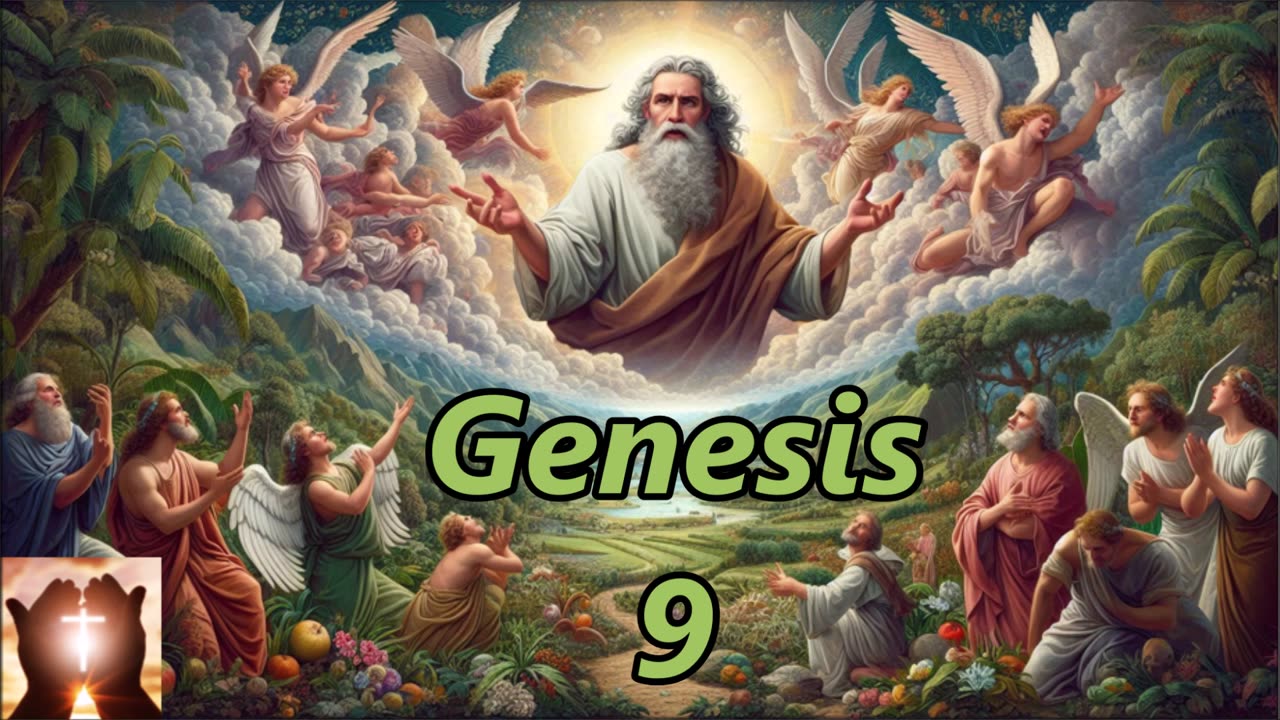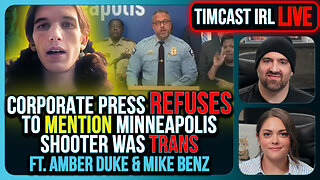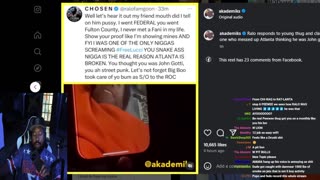Premium Only Content

Genesis 9
Verses 1-7: Blessing and mandates to Noah.
Verses 8-17: The rainbow covenant.
Verses 18-29: Ham’s sin and the blessings/curses on Noah’s sons.
Summarized Study
1. Genesis 9:1-7 – Blessing and Mandates
Analysis: God blesses Noah and his sons, repeating the mandate to “be fruitful and multiply” (cf. Gen 1:28). He permits eating meat (with a restriction on blood, symbolizing life) and establishes the sanctity of human life, demanding punishment for shedding blood, as humans are made in God’s image.
Application: Life is sacred. We must respect creation and value human dignity.
2. Genesis 9:8-17 – The Rainbow Covenant
Analysis: God makes a covenant with Noah, his descendants, and all creation, promising never again to destroy the earth with a flood. The rainbow is the sign of this eternal covenant, recalling divine mercy.
Application: The covenant reflects God’s faithfulness. The rainbow reminds us of His grace and promise of preservation.
3. Genesis 9:18-29 – Ham’s Sin and Consequences
Analysis: Noah plants a vineyard, becomes drunk, and lies uncovered. Ham sees his father’s nakedness and tells his brothers, who cover Noah respectfully. Noah curses Canaan (Ham’s son) and blesses Shem and Japheth. Noah dies at 950 years.
Application: Sin persists, but honor and respect are vital in family relationships. God uses even human weakness to fulfill His purposes.
Theological Themes
Restoration: God renews creation, giving humanity a fresh start.
Sanctity of Life: The image of God in humans demands respect for life.
Covenant: The rainbow promise shows God’s grace and faithfulness.
Persistent Sin: Even after the flood, humanity remains prone to sin.
Controversial Issues
Eating Meat: Permission to eat meat (v. 3) is new, suggesting humanity was vegetarian before the flood, possibly due to post-flood changes in creation.
Ham’s Sin: The text is vague about the severity of Ham’s act (seeing nakedness may imply disrespect or more). The curse falls on Canaan, not Ham, possibly for prophetic reasons (linked to the Canaanites).
Curse of Canaan: Some misinterpret it as justifying slavery or discrimination, but this is incorrect; the text focuses on family dynamics and spiritual consequences, not race.
Practical Applications
Value Life: Respect human dignity as a reflection of God’s image.
Trust Promises: See the rainbow as a reminder of God’s faithfulness.
Honor Family: Treat relatives with respect, avoiding dishonor.
Grace in Weakness: Recognize that God works despite human failings.
Reflection Questions
How can you honor the sanctity of life in your actions?
What does the rainbow covenant teach about God’s faithfulness?
How can you handle family failings in light of Noah and Ham’s story?
-
 9:43
9:43
The Pascal Show
14 hours ago $0.36 earnedWHOA! Annunciation School Sh**ter Identified... Heartbreaking & Insane
1.7K2 -
 22:42
22:42
Liberty Hangout
8 hours agoCollege Democrats Say Gangs Are GOOD!
73.8K63 -
 2:14:50
2:14:50
Badlands Media
13 hours agoBadlands Media Fantasy Football Live Draft
43.2K -
 2:12:29
2:12:29
Inverted World Live
7 hours agoWe Are Time Travelers | Ep. 100
86.1K13 -
 2:57:09
2:57:09
TimcastIRL
7 hours agoCorporate Press Refuses To Mention Minneapolis Shooter Was Trans | Timcast IRL
192K101 -
 5:26:57
5:26:57
Akademiks
7 hours agoWar in RAT-LANTA. Young Thug vs Gunna vs Ralo vs YSL MONDO. Who Will Le Bebe Pick. FINAL CRASHOUT!
60.1K5 -
 1:02:24
1:02:24
Man in America
10 hours agoThe Final Battle: Nanotech, Transhumanism & the War for Your Soul w/ Dr. Ed Group
48.8K6 -
 39:56
39:56
Sarah Westall
5 hours agoUpcoming World Wide Economic Collapse/Deep Recession & What the Big Money is Doing w/ Ed Dowd
46.7K5 -
 2:52:55
2:52:55
Barry Cunningham
6 hours agoIT'S MOVIE NIGHT WITH BARRY!
52.6K29 -
 31:05
31:05
The Why Files
2 days agoPeru's Most Terrifying Mystery | The Face Peelers
58.7K41